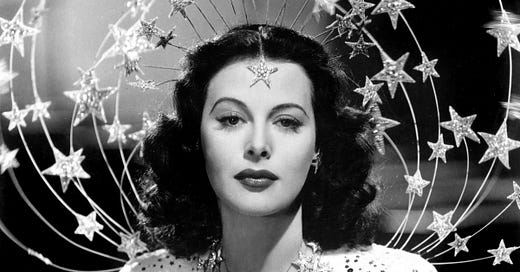There is Hollywood the State of Mind, which we all share. But there is also Hollywood the Place, where some of us have lived.
I did once.
Even as Hollywood reimagines itself for the 21st Century, the glamorous ghosts remain, still swanning about in the nimbus of vanished playgrounds: Ciro’s, Frascati’s, The Coconut Grove… a nightscape of Hollywood at play. Even the May Company, with its art moderne spindle in blazing Los Angeles daylight, even that building comes with its own claims on this dream of Hollywood we share.
Demolished now, the May Company… the block reclaimed for the Academy Museum of Motion Pictures, which opened in September.
But perhaps… if you squint your eyes, with just a little — shall we say— magic in your soul, you will see the May Company sitting still at the intersection of Wilshire and the imagination.
The May Company was known to me long before I got to Wilshire Boulevard, from reading Hollywood Babylon. It was the department store where Hedy Lamarr was arrested. The culty, gossipy Babylon tittered and struck attitudes of disapproval that were outrageously overblown, in keeping with the prurient bitchery of its author, the humorless Kenneth Anger. In truth, Hedy Lamarr was old at the time of the crime, very old, and the sad little things she slipped into her handbag -- laxative tablets, eye drops -- were themselves melancholy asides about the wreckage of time.
But time plays tricks.
Hedy Lamarr is remembered now not so much as a movie star but as the Mother of WiFi. The Electronic Frontier Foundation gave her a posthumous award in 1997 for the invention of a frequency hopping technology, a way to make radio messages unreadable by the Nazis, that would prove to be the foundation of WiFi. Lamarr was too glamorous at the time she patented the technology, too much in the heightened Hollywood style to be taken seriously by the generals and men of purpose, and so the technology was rejected. She was told— one imagines with avuncular cordiality — that she could make better use of her “considerable talents” selling war bonds.
Which, by the way, she did. “Selling $7 million worth of war bonds in a single day,” writes the Los Angeles Times, “offering kisses at $50,000 a pop, and dancing with soldiers at the Hollywood USO canteen.”
"Any girl can be glamorous,” Hedy wrote in her tell-all autobiography Ecstasy and Me. “All you have to do is stand still and look stupid."
By the time of her arrest, though, Hedy Lamarr was all but forgotten, with just enough old-time juice to blast a nasty exploding blurb on the cover of the National Inquirer: “Hedy Lamarr… Make-Up Thief!”
Hedy, by then, was living no longer in physical Hollywood, but in the Hollywood State of Mind. “All the other stores let me do it,” she huffed when she was stopped in the parking lot by a security guard.
Perhaps being a movie star, perhaps after a career spent above the title, Hedy, Miss Lamarr, had forgotten that the world is not the studio commissary and things are not simply given to you because you are, as the studio spin machine had it, “the most beautiful woman in the world.”
And so the ghost of the vanished May Company has its own ghost, and Hedy Lamarr will always hover there in the moonlight, at the intersection of Wilshire and the imagination, at a phantom makeup counter— the widow's peak, the black velvet hair, the red lipstick — still young, the odd detail about eye drops and laxatives not making the legend's final cut.
Screencap via YouTube and Tektronix: Ziegfield Girl, 1941, MGM
DVD available on Amazon
Yours truly,








Speaking of magic, this is a transportive, otherworldly recounting. Sublime syntax.